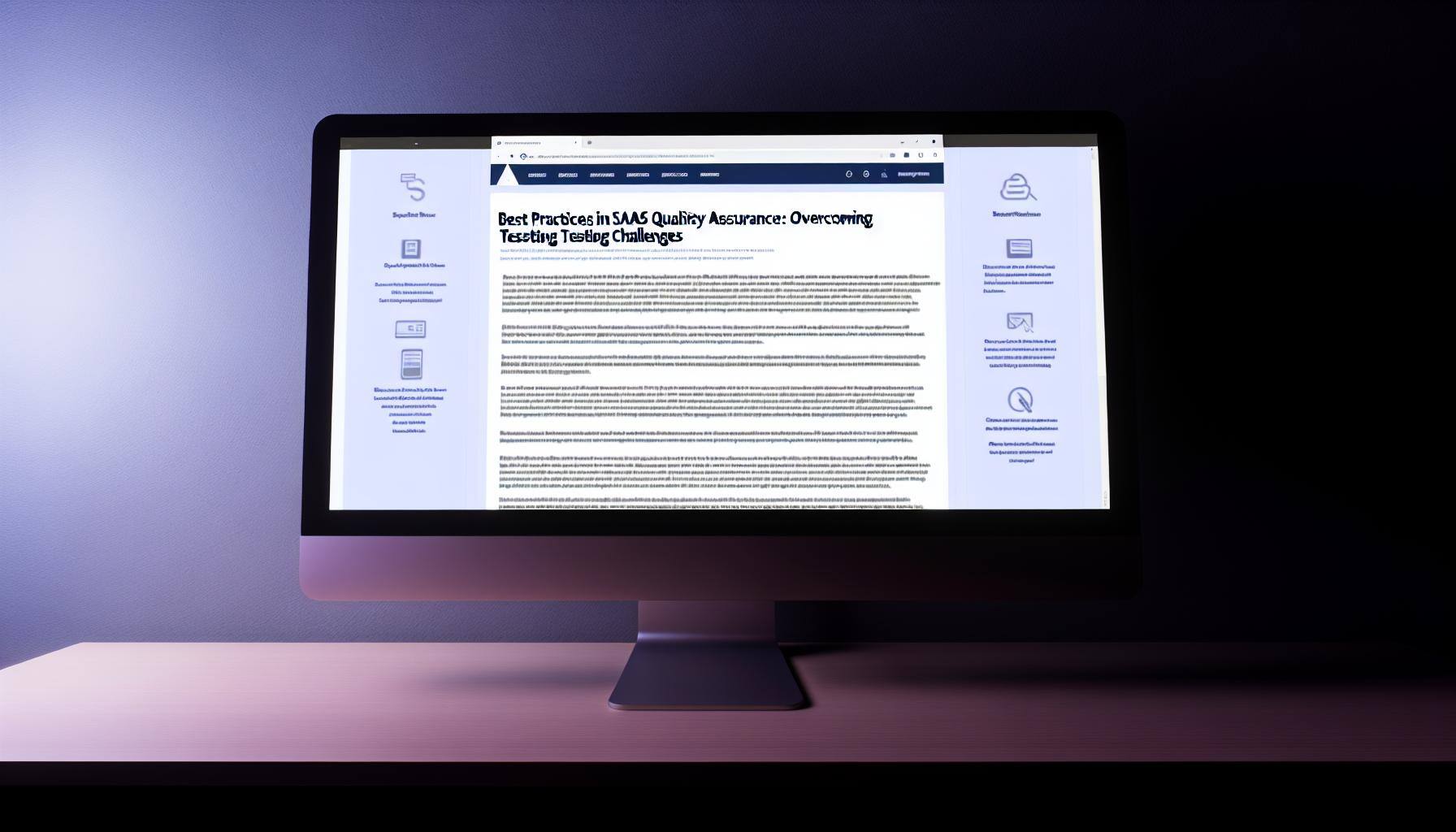The Perfect Balance: Speed and Quality in SaaS Product Development
Striking a Balance Between Speed and Quality in SaaS Product Development In today's rapidly evolving Software as a Service (SaaS) landscape, the...
4 min read
Brian Polackoff
:
Jun 28, 2024 12:37:00 PM

In today's fast-paced digital landscape, Software as a Service (SaaS) products are increasingly becoming the norm for businesses looking to streamline their operations and enhance customer experiences. However, the success of a SaaS product heavily relies on the quality of its development and the effectiveness of testing approaches and quality assurance processes.
Quality Assurance (QA) is a critical component in the development of SaaS products to ensure software quality and performance, often employing modern SaaS testing tools. Effective SaaS testing strategies involve thorough testing of all aspects of the application, including functionality, security, and scalability, among others, utilizing both traditional testing and automation tools.
Implementing a robust testing strategy involves various testing methods such as functional testing, security testing, and compatibility testing. By ensuring comprehensive test coverage, teams can identify defects early in the development cycle and address them promptly to avoid costly rework, using both manual testing and automated techniques.
Testing SaaS applications comes with its own set of challenges, including the need for thorough regression testing, as updates and changes can have a cascading impact on the entire application. Additionally, ensuring the compatibility of the application across different platforms and devices poses a significant challenge in SaaS testing.
Test coverage is essential in ensuring that all functionalities and modules of a SaaS application are adequately tested. Automation testing plays a crucial role in achieving comprehensive test coverage and in speeding up the testing process while maintaining accuracy.
In the realm of SaaS product development, managing defects and optimizing test cases are key areas that can impact the software quality. Defect management involves identifying, prioritizing, and resolving defects efficiently to maintain a high-quality standard in the application as part of an effective software quality assurance process.
An effective defect management process involves recording defects, assigning them to appropriate team members, and tracking their resolution. By implementing a structured defect management system, teams can ensure that all identified issues are addressed promptly to enhance the user experience.
Test cases are the building blocks of software testing, and optimizing them for SaaS applications is crucial for efficient testing. Testers need to carefully design test cases that cover all possible scenarios and ensure that the application functions as intended under different conditions.
Continuous improvement of the testing process is essential for achieving better results in SaaS product development. By leveraging automation testing tools and adopting industry best practices, teams can streamline the testing process and deliver high-quality software products to end-users, effectively managing SaaS testing challenges.
Implementing security testing, scalability testing, and focusing on user experience are essential best practices in ensuring the quality of SaaS products, addressing common challenges within the industry. Security testing helps identify vulnerabilities in the application and mitigate potential risks, while scalability testing ensures that the application can handle increasing loads efficiently.
Security is a paramount concern in SaaS development, and conducting thorough security testing helps in identifying and addressing security gaps in the application. By testing for vulnerabilities such as SQL injection and cross-site scripting, teams can safeguard the application from potential cyber threats.
Scalability testing is crucial for SaaS platforms to ensure that the application can scale up or down based on user demand. By simulating varying levels of user loads, teams can identify performance bottlenecks and optimize the application's performance to deliver a seamless user experience, a crucial aspect of SaaS testing methodology.
User experience plays a vital role in the success of a SaaS product, and QA testing, including exploratory testing, helps in identifying usability issues and enhancing the overall user interface. By conducting usability tests and gathering feedback from end-users, teams can make informed decisions to improve the user experience of the application.
Selecting the right testing tools is crucial for effective testing and quality assurance in SaaS applications. Popular testing tools such as Salesforce, Selenium, and Jira offer a wide range of features to support different testing requirements and methodologies.
Tools like Selenium are widely used for automation testing, while Jira is popular for defect tracking and project management. By integrating these tools into the testing process, teams can improve efficiency, collaboration, and visibility throughout the development lifecycle, addressing common challenges in SaaS testing.
Integration testing is essential in SaaS product development to ensure that individual modules work cohesively when integrated into the larger application. By testing the interactions between different components, teams can validate the data flow and functionality of the application as a whole, addressing common SaaS testing challenges.
Automation testing plays a significant role in accelerating the testing process and improving the overall efficiency of testing activities. By automating repetitive test cases and regression tests, teams can focus on more critical aspects of testing and ensure faster release cycles without compromising quality.
To deliver high-quality SaaS products to customers, having an expert QA team is imperative in the development process. Performance testing, bug identification, and defect resolution are essential aspects of QA that contribute to the overall software quality.
An experienced QA team brings domain expertise and testing skills to the table, ensuring that the SaaS product meets the required quality standards. By collaborating with developers and stakeholders, QA teams can identify potential issues early in the development lifecycle and address them proactively.
Performance testing is crucial in ensuring that a SaaS application can handle the expected load and deliver optimal performance under various conditions. By simulating real-world scenarios and monitoring key performance indicators, teams can identify performance bottlenecks and optimize the application for scalability.
Bugs and defects are inevitable in software development, but effective defect management practices, often integrated within a comprehensive software quality assurance framework, can help in addressing them promptly. By capturing, prioritizing, and resolving defects efficiently, teams can enhance the reliability and usability of the SaaS product for end-users.

Striking a Balance Between Speed and Quality in SaaS Product Development In today's rapidly evolving Software as a Service (SaaS) landscape, the...

Software as a Service (SaaS) has revolutionized the way businesses operate by providing scalable, on-demand access to software applications,...

In the dynamic world of Business-to-Business (B2B) Software as a Service (SaaS) companies, the role of a software developer transcends traditional...